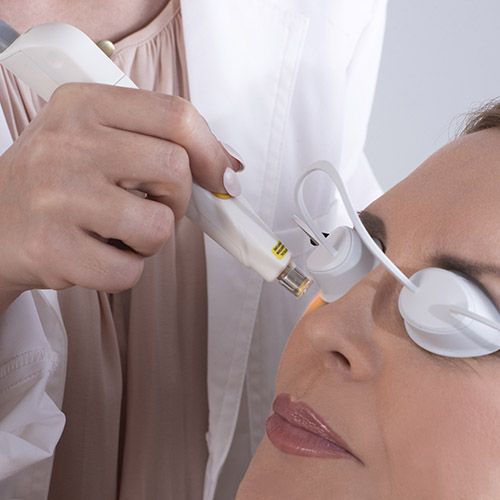

Did you know there are contact lenses capable of altering your eye color, correct for both near and distance vision, or combining features of both hard and soft lenses simultaneously? At Prevea, we offer a variety of lens types to cater to your specific vision requirements.
An alternative approach for treating presbyopia is monovision correction, where one contact lens is adjusted for near vision and the other for distance vision.
Additionally, individuals with dry eyes may opt for scleral lenses, as they allow increased oxygen and saline to reach the eye. It's worth noting that scleral lenses are pricier compared to both soft and hard corneal lenses.
Curious about learning more? Visit your local Prevea Eye Care or schedule an appointment with a provider today.
Soft lenses
Soft contact lenses offer comfort to the wearer and are available in various styles. Recent technological advancements have enhanced the flow of oxygen to the eye while wearing soft contact lenses, contributing to improved eye health.Daily wear lenses
Daily wear lenses are specifically designed for daily use. Insert them in the morning and remove them in the evening. While some are single-use disposables, others can be reused and replaced at intervals ranging from weekly to monthly. Daily wear lenses are particularly suitable for occasional contact lens users.Extended wear lenses
In contrast to daily wear lenses, extended wear lenses are designed to be worn overnight and during periods of sleep. This feature makes them well-suited for individuals with hectic schedules and those who experience frequent awakenings during sleep. It's important to note that these lenses still require occasional cleaning. However, keeping them in overnight does pose additional risks, primarily the potential for infection and the possibility of oxygen deprivation to the cornea.Toric lenses
Toric lenses, a specialized type of lens, are crafted specifically for individuals dealing with astigmatism. Blurry vision results from light hitting the cornea at multiple points in astigmatism. The unique design of toric lenses addresses this issue, and they are suitable for both daily and extended wear.Colored lenses
Colored lenses are a novelty lens, featuring a tint that creates the illusion of altering the wearer's eye color. Available for daily wear, extended wear and toric lenses, these are corrective in nature and distinct from decorative lenses, which are reserved for special occasions.RGP (hard) lenses
Rigid gas permeable (RGP) lenses are crafted from a firmer plastic compared to soft lenses. True to their name, the material still allows gases, including oxygen, to permeate the lens. Benefits of the RGP lenses encompass sharper vision, an extended lifespan, better heightened resilience against bacteria and allergens, and, in many instances, cost savings. They are especially useful for people with aphakia, Fuchs' dystrophy, keratoconus and other medical conditions. However, they are not as comfortable as most soft lenses, leading many people away from using them.Hybrid contact lenses
The unique combination of a rigid center surrounded by a soft outer layer not only offers comfort comparable to soft lenses but also addresses the visual needs associated with rigid lenses. This makes them an excellent choice for individuals seeking both comfort and enhanced visual acuity, especially when dealing with various eye health challenges such as aphakia, Fuchs' dystrophy or keratoconus.Decorative lenses
Decorative lenses represent a distinct type of lens, solely altering the eye's appearance without any vision correction. While commonly used as costume accessories, particularly around Halloween, some people use them to conceal eye defects. Despite lacking corrective properties, prescriptions are necessary for decorative lenses. Off-market non-prescription lenses can potentially scratch or cause injury to the eyes, even leading to blindness. It's crucial to clean and maintain decorative lenses just like corrective contact lenses.Multifocal lenses
Multifocal lenses are used to address presbyopia, a condition often referred to as "age-related farsightedness," commonly affecting individuals over 40. These lenses provide corrections for both near and distance vision, promoting a seamless visual experience for the wearer.An alternative approach for treating presbyopia is monovision correction, where one contact lens is adjusted for near vision and the other for distance vision.
Scleral lenses
Scleral lenses, larger than conventional corneal contacts, including both soft and hard varieties, rest on the sclera surrounding the cornea. They are beneficial for addressing problems stemming from a misshapen cornea, cornea disease or previous eye trauma.Additionally, individuals with dry eyes may opt for scleral lenses, as they allow increased oxygen and saline to reach the eye. It's worth noting that scleral lenses are pricier compared to both soft and hard corneal lenses.
Bandage lenses
Much like decorative lenses, bandage lenses lack corrective properties. Typically prescribed for a temporary period after an injury, they serve to safeguard the cornea and facilitate the healing process. While bandage lenses do not provide vision correction, there's a possibility of improved vision due to the natural healing of the eye during their use.Curious about learning more? Visit your local Prevea Eye Care or schedule an appointment with a provider today.

.jpg?width=500&height=500&ext=.jpg)

